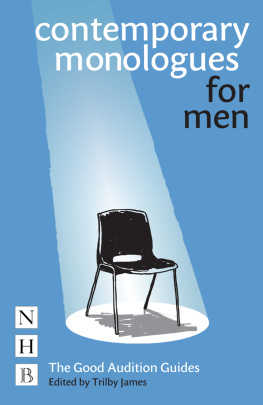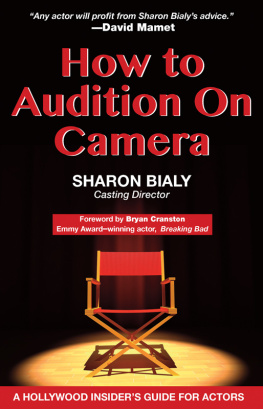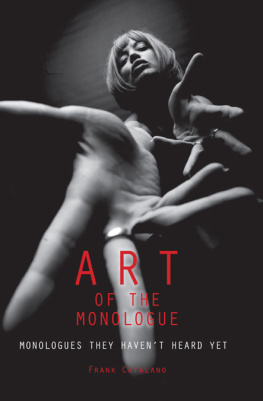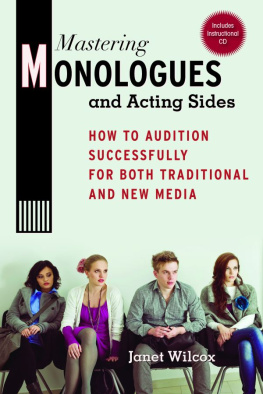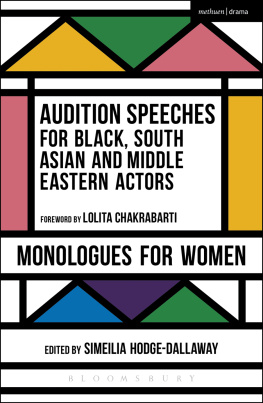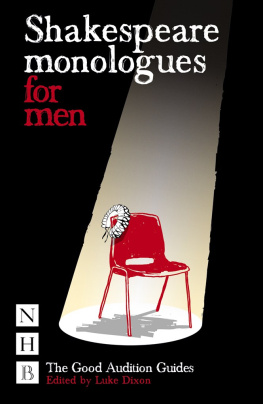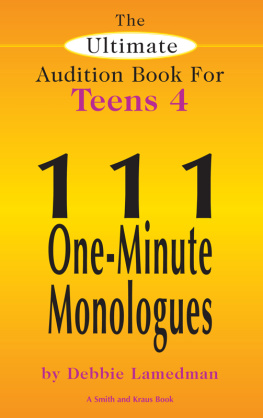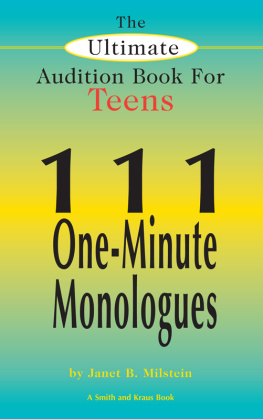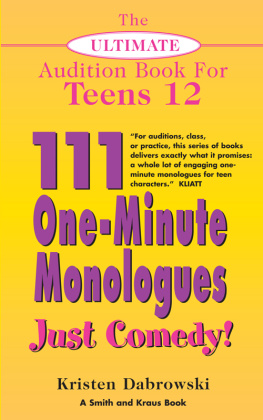Great Monologues
for Young Actors
Volume III
Craig Slaight and Jack
Sharrar
Copyright 2008, Craig Slaight and Jack Sharrar
SMITH AND KRAUS PUBLISHERS
MONOLOGUE ANTHOLOGIES FOR YOUNG ACTORS
Winners Competition Series Volume 1: Award-winning 60-Second Monologues for Ages 5-12 by Janet Milstein
Winners Competition Series Volume 3: Award-winning 60-Second Monologues for Ages 13-18 by Janet Milstein
Great Monologues for Young Actors Volumes 1 and 2
Teens Speak: 60 Original Character Monologues for Girls Ages 13-15
Teens Speak: 60 Original Character Monologues for Boys Ages 13-15
Teens Speak: 60 Original Character Monologues for Girls Ages 16-18
Teens Speak: 60 Original Character Monologues for Boys Ages 16-18
Multicultural Monologues for Young Actors
Monologues in Dialect for Young Actors
The Spirit of America: Patriotic Monologues and Speeches for Middle and High School Students
Hot Spots for Teens Volume 1: One-Person Cold-reading Copy for TV Commercial Audition Success
The Ultimate Audition Book for Teens Volume 1: 111 One-Minute Monologues
The Ultimate Audition Book for Teens Volume 2: 111 One-Minute Monologues
The Ultimate Audition Book for Teens Volume 3: 111 One-Minute Monologues
The Ultimate Audition Book for Teens Volume 4: 111 One-Minute Monologues
The Ultimate Audition Book for Teens Volume 5: 111 Shakespeare Monologues
The Ultimate Audition Book for Teens Volume 6: 111 One-Minute Monologues for Teens by Teens
The Ultimate Audition Book for Teens Volume 7: 111 Monologues from Classical Theater, 2 Minutes and Under
The Ultimate Audition Book for Teens Volume 9: 111 Monologues from Contemporary Literature, 2 Minutes and Under
The Ultimate Audition Book for Teens Volume 10: 111 One-Minute Monologues for Teens by Teens
The Ultimate Audition Book for Teens Volume 11: One-Minute Monologues by Type
The Ultimate Audition Book for Teens Volume 12: 111 One-Minute Monologues Just Comedy!
The Ultimate Audition Book for Teens Volume 13: 111 One-Minute Monologues Active Voices
To order call toll-free (888) 282-2881
for more information visit us online at www.smithandkraus.com
Contents
Introduction
The Monologue Audition
[Note: Although many of the speeches in this book are appropriate for auditions, not all the material in this collection will be suitable for auditions. Some selections are meant for study and exploration in acting techniques. In any audition situation, the first thing to ascertain is what is required. You must carefully seek the exact nature of the audition before selecting material.]
As professional directors who work at a major American regional theater, and acting teachers who have been teaching young and journeymen actors for many years, we often find auditions lacking the central preparation necessary to make them successful. We can all agree that auditions may not be the most effective way to assess acting potential. However, until another method has been introduced, we are all (actors and directors) saddled with the standard two-minute meeting. Here are some of the areas of challenge in auditioning with monologues.
What material should I pick?
The most useful advice here is to select material spoken by characters that you could believably play. If your audition is for a specific role in a particular play, listen carefully for what is required for the audition. If the director/producer wishes to hear you in a speech of your choosing, select something of a similar tone to the play for which you are auditioning. Unless required, dont use a speech from the play for which you are auditioning. Because roles are created in an evolutionary process during rehearsals, with much input from the director (or the writer if it is a new play), why lay out impressions before youve had the opportunity to discuss and work on the role with the director unless you absolutely have to? If you are doing a general audition (for the purpose of ascertaining an overall impression of your work as an actor), again your choices should be roles that you could believably play. If you really feel that you need to startle the director into seeing a side of you that isnt easily visible, save that speech as the extra piece youve prepared just for that reason, and only if youre asked for something additional after presenting your prepared set. However, if you are asked to show two contrasting monologues (usually one from the classical and one from the contemporary repertoire), select speeches by characters you could believably play. With any audition situation, selecting age-appropriate material is expected. You should always select material that is well written, offers depth of idea and language... and is chosen from a play in which you could be cast. [Have we made our feelings clear about the nature of the material you should select?]
What is the event?
The name monologue is actually misleading. Although you are the only character speaking, there is nothing mono about the event. It is a scene, in which we only hear your side. Even a soliloquy has an intended receiver. Hamlets famous To be, or not to be... is intended to sort out aloud an emotionally heightened turning point in the young princes life. He is grappling with himself, and his conflicting inner self becomes the other character. In most cases, the monologue is an elongated speech in a scene between at least two people, sometimes more.
Out of the starting gate!
Many actors cheat the first beat of their monologue audition. The urge to speak is about the most important part of the entire two-minute audition speech. What has just happened? What has just been said? Who has said it? To whom? Jumping right into your first line without first creating the context in which it is uttered is cheating you of one of the most important acting moments. That moment doesnt come at the end of the speech, or in the middle when your character suddenly breaks down and cries. The urge to speak tells us more about your character than the tears ever could.
Most monologues are not uninterrupted tirades.
The actor must leave room for nonverbal reactions by the other character(s) to what they are saying. Rapid-fire speech, no matter how heightened the emotion, may meet your audition time limit but doesnt allow you to deal with the reactions so important to any communication. The reactions of others in the scene to what you are saying (even if imagined in the audition moment) allows your character to continue allows him or her to modify the intention throughout the speech. Take Mr. Hamlets solo again as an example. When asking himself probing questions, isnt there a moment or two when he must actually consider what he has said? How many of us speak in paragraphs blindly without at least thinking in the moment, or without watching closely the reactions of those were speaking to? I know of only a few people like this and I wouldnt bother having a conversation with them because it is all one-sided. That is not the point of a monologue. Sliding thoughtlessly through the language without some contemplation or awareness of how what you say is landing on others would seem almost drug-induced or manic. Acting is listening as well as speaking and this mustnt be forgotten when working solo.
Working moment-to-moment, or beat-to-beat, with the progress charted by intention and reaction is key to showing a complete moment in this characters life. Dont rush the decisions the character makes in the moment. These decisions must inform each subsequent beat throughout the monologue.
What do I do with these things at the end of my arm?
Next page

